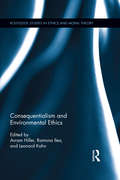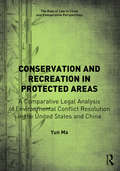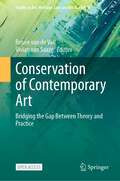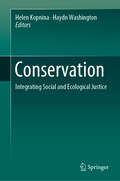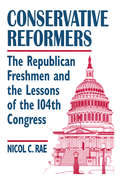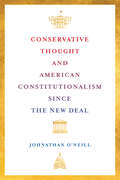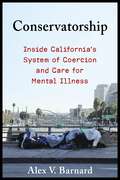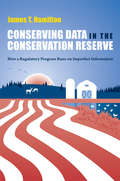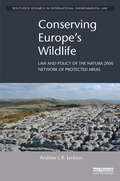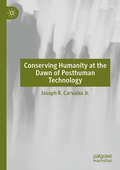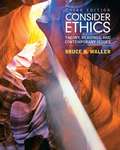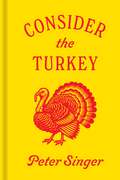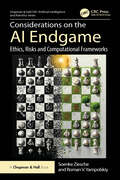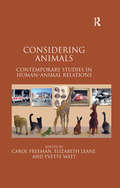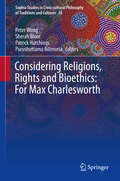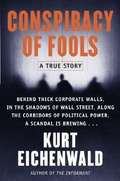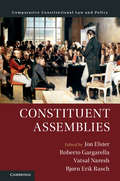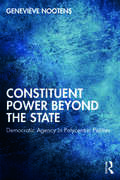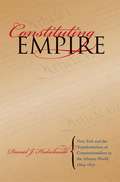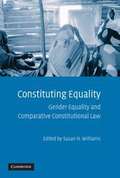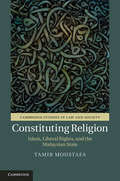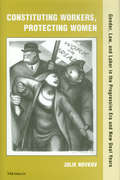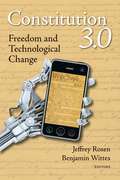- Table View
- List View
Consequentialism and Environmental Ethics: Consequentialism And Environmental Ethics (Routledge Studies in Ethics and Moral Theory)
by Ramona Ilea Avram Hiller Leonard KahnThis volume works to connect issues in environmental ethics with the best work in contemporary normative theory. Environmental issues challenge contemporary ethical theorists to account for topics that traditional ethical theories do not address to any significant extent. This book articulates and evaluates consequentialist responses to that challenge. Contributors provide a thorough and well-rounded analysis of the benefits and limitations of the consequentialist perspective in addressing environmental issues. In particular, the contributors use consequentialist theory to address central questions in environmental ethics, such as questions about what kinds of things have value; about decision-making in light of the long-term, intergenerational nature of environmental issues; and about the role that a state’s being natural should play in ethical deliberation.
Conservation and Recreation in Protected Areas: A Comparative Legal Analysis of Environmental Conflict Resolution in the United States and China (The Rule of Law in China and Comparative Perspectives)
by Yun MaThis book provides a comprehensive and up to date comparative study of the management and resolution of conflicts between conservation and recreation in protected areas in the US and China. Competing claims on the use of nature, increasing regulation of land use and recreational activities, and the conflicting goals between conservation and development have led to a rise in conflicts in the designation and management of protected areas. How to effectively manage and resolve these conflicts has become a challenge for both legislators and managers. By adopting an institutional dimension in legal interpretation, this book critically examines how such conflicts are dealt with in the legal regimes of the US and China while exploring interactions between legislatures, agencies and courts. The book searches for a plausible solution to improve the legal framework of protected areas in China by emulating pertinent mechanisms developed in the US, whilst also presenting legal and policy recommendations to the US. This informative book will be useful for legal scholars in Chinese law, nature conservation law, administrative law and comparative law.
Conservation of Contemporary Art: Bridging the Gap Between Theory and Practice (Studies in Art, Heritage, Law and the Market #9)
by Vivian Van Saaze Renée van de VallThis open access book investigates whether and how theoretical findings and insights in contemporary art conservation can be translated into the daily work practices of conservators or, vice versa, whether and how the problems and dilemmas encountered in conservation practice can inform broader research questions and projects. For several decades now, the conservation of contemporary art has been a dynamic field of research and reflection. Because of contemporary art’s variable constitution, its care and management calls for a fundamental rethinking of the overall research landscape of museums, heritage institutions, private-sector organizations and universities. At first, this research was primarily pursued by conservation professionals working in or with museums and other heritage organizations, but increasingly academic researchers and universities became involved, for instance through collaborative projects. This book is the result of such collaboration. It sets out to bridge the “gap” between theory and practice by investigating conservation practices as a form of reflection and reflection as a form of practice.
Conservation: Integrating Social and Ecological Justice (Routledge Explorations In Environmental Studies)
by Helen Kopnina Haydn WashingtonThis book provides keys to decrypt current political debates on the environment in light of the theories that support them, and provides tools to better understand and manage environmental conflicts and promote environmentally friendly behaviour. As we work towards global sustainability at a time when efforts to conserve biodiversity and combat climate change correspond with land grabs by large corporations, food insecurity, and human displacement. While we seek to reconcile more-than-human relations and responsibilities in the Anthropocene, we also struggle to accommodate social justice and the increasingly global desire for economic development. These and other challenges fundamentally alter the way social scientists relate to communities and the environment. This book takes as its point of departure today’s pressing environmental challenges, particularly the loss of biodiversity, and the role of communities in protected areas conservation. In its chapters, the authors discuss areas of tension between local livelihoods and international conservation efforts, between local communities and wildlife, and finally between traditional ways of living and ‘modernity’. The central premise of this book is while these tensions cannot be easily resolved they can be better understood by considering both social and ecological effects, in equal measure. While environmental problems cannot be seen as purely ecological because they always involve people, who bring to the environmental table their different assumptions about nature and culture, so are social problems connected to environmental constraints. While nonhumans cannot verbally bring anything to this negotiating table, aside from vast material benefits that society relies on, the distinct perspective of this book is that there is a need to consider the role of nonhumans as equally important stakeholders – albeit without a voice. This book develops an argument that human-environmental relationships are set within ecological reality and ecological ethics and rather than being mutually constitutive processes, humans have obligate dependence on nature, not vice versa. This would enable an ethical position encompassing the needs of other species and giving simultaneous (without one being subordinated to another) consideration to justice for humans and non-humans alike. The book is accessible to both social scientists and conservation specialists, and intends to contribute to strengthening interdisciplinary collaborations in the field of conservation.
Conservative Reformers: The Freshman Republicans in the 104th Congress
by Nicol C. RaeNicol Rae's engaging account of the Republican revolutionaries' freshman year in Congress persuasively demonstrates that the precepts set forth by Madison in Federalist 10 and 51 are still in force in our remarkably stable political system. The 73 Republican freshmen who entered the House of Representatives after the 1994 election were a well-organized group with majority status and a commitment to change. This book examines the extent to which they were successful in redirecting policy and reforming the institutions of representative government -- and the extent to which those same institutions moderated, and even frustrated, efforts to introduce radical, rapid -- indeed revolutionary -- change. Contrasts are drawn both with the role of the Republican freshmen in the Senate and with the power of the President as manifested in the 1995-96 budget battle. The book is based on interviews conducted by the author when he was an APSA Congressional Fellow in the offices of Rep. George P. Radanovich, president of the freshman Republican class, and Sen. Thad Cochran, chairman of the Senate Republican Conference.
Conservative Thought and American Constitutionalism since the New Deal
by Johnathan O'NeillAn intellectual history of American conservativism since the New Deal.The New Deal fundamentally changed the institutions of American constitutional government and, in turn, the relationship of Americans to their government. Johnathan O'Neill's Conservative Thought and American Constitutionalism since the New Deal examines how various types of conservative thinkers responded to this significant turning point in the second half of the twentieth century.O'Neill identifies four fundamental transformations engendered by the New Deal: the rise of the administrative state, the erosion of federalism, the ascendance of the modern presidency, and the development of modern judicial review. He then considers how various schools of conservative thought (traditionalists, neoconservatives, libertarians, Straussians) responded to these major changes in American politics and culture. Conservatives frequently argued among themselves, and their responses to the New Deal ranged from adaptation to condemnation to political mobilization. Ultimately, the New Deal pulled American governance and society permanently leftward. Although some of the New Deal's liberal gains have been eroded, a true conservative counterrevolution was never, O'Neill argues, a realistic possibility. He concludes with a plea for conservative thinkers to seriously reconsider the role of Congress—a body that is relatively ignored by conservative intellectuals in favor of the courts and the presidency—in America's constitutional order. Conservative Thought and American Constitutionalism since the New Deal explores the scope and significance of conservative constitutional analysis amid the broader field of American political thought.
Conservatorship: Inside California’s System of Coercion and Care for Mental Illness
by Alex V. BarnardIs involuntary psychiatric treatment the solution to the intertwined crises of untreated mental illness, homelessness, and addiction? In recent years, politicians and advocates have sought to expand the use of conservatorships, a legal tool used to force someone deemed “gravely disabled,” or unable to meet their needs for food, clothing, or shelter as a result of mental illness, to take medication and be placed in a locked facility. At the same time, civil liberties and disability rights groups have seized on cases like that of Britney Spears to argue that conservatorships are inherently abusive.Conservatorship is an incisive and compelling portrait of the functioning—and failings—of California’s conservatorship system. Drawing on hundreds of interviews with professionals, policy makers, families, and conservatees, Alex V. Barnard takes readers to the streets where police encounter homeless people in crisis, the locked wards where people receiving treatment are confined, and the courtrooms where judges decide on conservatorship petitions. As he shows, California’s state government has abdicated authority over this system, leaving the question of who receives compassionate care and who faces coercion dependent on the financial incentives of for-profit facilities, the constraints of underresourced clinicians, and the desperate struggles of families to obtain treatment for their loved ones.This book offers a timely warning: reforms to expand conservatorship will lead to more coercion but little transformative care until government assumes accountability for ensuring the health and dignity of its most vulnerable citizens.
Conserving Data in the Conservation Reserve: How A Regulatory Program Runs on Imperfect Information
by James HamiltonEnrolling over 30 million acres, the U.S. Conservation Reserve Program (CRP) is the largest conservation program in the United States. Under the guidelines of the CRP, the federal government pays farmers to stop farming their land in the hopes of achieving a variety of conservation goals, including the reduction of soil erosion, improvement of water quality, and creation of wildlife habitat. In Conserving Data, James T. Hamilton explores the role of information in the policy cycle as it relates to the CRP. The author asks how the creation and distribution of information about what is going on across these millions of enrolled acres has influenced the development of the program itself. Of the many CRP stakeholders, each accesses a different set of information about the CRP?s operations. Regulators have developed the Environmental Benefits Index as a rough indicator of a field?s conservation benefits and adopted that measure as a way to determine which lands should be granted conservation contracts. NGOs have used publicly available data from these contracts to show how CRP monies are allocated. Members of Congress have used oversight hearings and GAO reports to monitor the Farm Service Agency?s conservation policy decisions. Reporters have localized the impact of the CRP by writing stories about increases in wildlife and hunting on CRP fields in their areas. Conserving Data brings together and analyzes these various streams of information, drawing upon original interviews with regulators, new data from Freedom of Information Act requests, and regulatory filings. Using the CRP as a launch point, Hamilton explores the role of information, including 'hidden information,' in the design and implementation of regulatory policy.
Conserving Europe's Wildlife: Law and Policy of the Natura 2000 Network of Protected Areas (Routledge Research in International Environmental Law)
by Andrew L.R. JacksonThe Natura 2000 network of protected areas is the centrepiece of European Union nature policy, currently covering almost one-fifth of the EU’s entire land territory plus large marine areas. This vast EU-wide network, which aims to conserve Europe’s most valuable and threatened species and habitats, has major impacts on land use throughout all Member States of the EU. This book critically assesses the origins and implementation of the Natura 2000 network, established under the Birds Directive of 1979 and the Habitats Directive of 1992. Based on original archival research and interviews with key participants, the book records a detailed history of the origins and negotiation of Natura 2000 policy and law, with the history of EU environmental policy provided as a framework. An historical institutionalist approach is adopted, which emphasises the importance of understanding legal and policy development as processes that unfold over time. Three phases in the history of EU environmental policy are identified and described, and the history of EU nature policy is placed within the context of these three phases. Informed by this history, the author presents a comprehensive summary and assessment of the law and policy that protects Natura 2000 sites at EU level, and reviews the nature conservation outcomes for the targeted species and habitats. The book reveals how a knowledge of the history of Natura 2000 enriches our understanding of key issues such as conflicts in establishing and conserving the Natura 2000 network, EU integration in the field of nature conservation, and the future of EU nature policy.
Conserving Humanity at the Dawn of Posthuman Technology
by Joseph R. Carvalko Jr.This volume examines the latest scientific and technological developments likely to shape our post-human future. Using a multidisciplinary approach, the author argues that we stand at the precipice of an evolutionary change caused by genetic engineering and anatomically embedded digital and informational technologies. The author delves into current scientific initiatives that will lead to the emergence of super smart individuals with unique creative capacities. He draws on technology, psychology and philosophy to consider humans-as-they-are relative to autonomy, creativity, and their place in a future shared with ‘post humans.’ The author discusses the current state of bioethics and technology law, both which policymakers, beset by a torrent of revolutionary advances in bioengineering, are attempting to steer. Significantly, Carvalko addresses why we must both preserve the narratives that brought us to this moment and continue to express our humanity through, music, art, and literature, to ensure that, as a uniquely creative species, we don’t simply vanish in the ether of an evolution brought about by our own technology.
Consider Ethics: Theory, Readings, and Contemporary Issues
by Bruce N. WallerOffering a balance of theory and applications and a mix of text and readings, Consider Ethics begins with chapters covering ethical theory, each of which is followed by related, classical readings. The book concludes with an examination of six contemporary ethical issues presented in a pro/con format with introductory material that places each issue in context. Featuring selections from the world's most influential philosophers, this combination of primary texts and explanatory pedagogy presents the material in a clear, accessible way that does not sacrifice rigor. Making connections among different ethical theories throughout, the text helps students to engage the subject matter and apply theories to important contemporary ethical issues.
Consider the Turkey
by Peter SingerWhy this holiday season is a great time to rethink the traditional turkey feastA turkey is the centerpiece of countless Thanksgiving and Christmas dinners. Yet most of us know almost nothing about today&’s specially bred, commercially produced birds. In this brief book, bestselling author Peter Singer tells their story—and, unfortunately, it&’s not a happy one. Along the way, he also offers a brief history of the turkey and its consumption, ridicules the annual U.S. presidential &“pardon&” of a Thanksgiving turkey, and introduces us to &“a tremendously handsome, outgoing, and intelligent turkey&” named Cornelius. Above all, Singer explains how we can improve our holiday tables—for turkeys, people, and the planet—by liberating ourselves from the traditional turkey feast. In its place, he encourages us to consider trying a vegetarian alternative—or just serving the side dishes that many people already enjoy far more than turkey. Complete with some delicious recipes for turkey-free holiday feasting, Consider the Turkey will make you reconsider what you serve for your next holiday meal—or even tomorrow&’s dinner.
Considerations on the AI Endgame: Ethics, Risks and Computational Frameworks (Chapman & Hall/CRC Artificial Intelligence and Robotics Series)
by Soenke Ziesche Roman V. YampolskiyThis seminal volume offers an interdisciplinary exploration into the rapidly evolving field of artificial intelligence and its societal implications. Written by leading scholars Soenke Ziesche and Roman V. Yampolskiy, the book delves into a multitude of topics that address the rapid technological advancements in AI and the ethical dilemmas that arise as a result.The topics explored range from an in-depth look at AI welfare science and policy frameworks to the mathematical underpinnings of machine intelligence. These subjects include discussions on preserving our personal identity in technological contexts as well as on the question of AI identity, innovative proposals towards the critical AI value alignment problem and a call to merge Western and non-Western approaches towards universal AI ethics. The work also introduces unconventional yet crucial angles, such as the concept of "ikigai" in AI ethics and a pioneering attempt to map a potential AI-driven ikigai universe as well as the role of design formalisation, or "Designometry," in the creation of artefacts.By offering a balanced mix of theoretical and applied insights, the book serves as an invaluable resource for researchers, policymakers and anyone interested in the future of AI and the extent of its impact on society.
Considering Animals: Contemporary Studies in Human–Animal Relations
by Elizabeth Leane Carol Freeman Yvette WattConsidering Animals draws on the expertise of scholars trained in the biological sciences, humanities, and social sciences to investigate the complex and contradictory relationships humans have with nonhuman animals. Taking their cue from the specific 'animal moments' that punctuate these interactions, the essays engage with contemporary issues and debates central to human-animal studies: the representation of animals, the practical and ethical issues inseparable from human interactions with other species, and, perhaps most challengingly, the compelling evidence that animals are themselves considering beings. Case studies focus on issues such as animal emotion and human 'sentimentality'; the representation of animals in contemporary art and in recent films such as March of the Penguins, Happy Feet, and Grizzly Man; animals' experiences in catastrophic events such as Hurricane Katrina and the SARS outbreak; and the danger of overvaluing the role humans play in the earth's ecosystems. From Marc Bekoff's moving preface through to the last essay, Considering Animals foregrounds the frequent, sometimes uncanny, exchanges with other species that disturb our self-contained existences and bring into focus our troubled relationships with them. Written in an accessible and jargon-free style, this collection demonstrates that, in the face of species extinction and environmental destruction, the roles and fates of animals are too important to be left to any one academic discipline.
Considering Marijuana Legalization: Insights for Vermont and Other Jurisdictions
by Mark A. R. Kleiman Peter H. Reuter Robert J. Maccoun Beau Kilmer Rosalie Liccardo Pacula Jonathan P. Caulkins Gregory Midgette Pat OglesbyAnalysis
Considering Religions, Rights and Bioethics: Memorial Volume For Max Charlesworth (Sophia Studies in Cross-cultural Philosophy of Traditions and Cultures #30)
by Peter Wong Purushottama Bilimoria Sherah Bloor Patrick HutchingsThis volume engages in conversation with the thinking and work of Max Charlesworth as well as the many questions, tasks and challenges in academic and public life that he posed. It addresses philosophical, religious and cultural issues, ranging from bioethics to Australian Songlines, and from consultation in a liberal society to intentionality. The volume honours Max Charlesworth, a renowned and celebrated Australian public intellectual, who founded the journal Sophia, and trained a number of the present heirs to both Sophia and academic disciplines as they were further developed and enhanced in Australia: Indigenous Australian studies, philosophy of religion, the study of the tension between tradition and modernity, phenomenology and existentialism, hermeneutics, feminist philosophy, and philosophy of science that is responsive to environmental issues.
Constituent Assemblies (Comparative Constitutional Law And Policy Ser.)
by Roberto Gargarella Jon Elster Vatsal Naresh Bjørn Erik RaschComparative constitutional law has a long pedigree, but the comparative study of constitution-making has emerged and taken form only in the last quarter-century. While much of the initial impetus came from the study of the American and French constituent assemblies in the late eighteenth century, this volume exemplifies the large comparative scope of current research. The contributors discuss constituent assemblies in South East Asia, North Africa and the Middle East, Latin America, and in Nordic countries. Among the new insights they provide is a better understanding of how constituent assemblies may fail, either by not producing a document at all or by adopting a constitution that fails to serve as a neutral framework for ordinary politics. In a theoretical afterword, Jon Elster, an inspirational thinker on the current topic, offers an analysis of the micro-foundations of constitution-making, with special emphasis on the role of crises-generated passions.
Constituent Power Beyond the State: Democratic Agency in Polycentric Polities
by Geneviève NootensThe concept of constituent power plays a major part in modern political and legal theory— in how we think about the political. This book tackles the twofold issue of public authority and public autonomy in the modern conception of the political by analysing the notion of constituent power, its function in the modern political apparatus, and debates about its meaning and function in our own context. Focusing on contemporary debates on constitutionalism "beyond" the state, Geneviève Nootens assesses the prospects for recasting the notion of constituent power in a polycentric setting that challenges state sovereignty as embodying the autonomy of the political. She argues that constituent power belongs with the conceptual apparatus of a theory of government peculiar to a statist way of knowing, and being into, the world, and that it is too much dependent upon the statist framework for it to have critical purchase on the new mappings of public authority. Nootens stresses the critical need to frame public authority appropriately if we are to conceptualize a conception of collective political agency that can sustain public autonomy in the current era. Constituent Power Beyond the State will be of interest to students and scholars of political theory, democratic theory, law, and constitutionalism.
Constituting Empire
by Daniel J. HulseboschAccording to the traditional understanding of American constitutional law, the Revolution produced a new conception of the constitution as a set of restrictions on the power of the state rather than a mere description of governmental roles. Daniel J. Hulsebosch complicates this viewpoint by arguing that American ideas of constitutions were based on British ones and that, in New York, those ideas evolved over the long eighteenth century as New York moved from the periphery of the British Atlantic empire to the center of a new continental empire. Hulsebosch explains how colonists and administrators reconfigured British legal sources to suit their needs in an expanding empire. In this story, familiar characters such as Alexander Hamilton and James Kent appear in a new light as among the nation's most important framers, and forgotten loyalists such as Superintendent of Indian Affairs Sir William Johnson and lawyer William Smith Jr. are rightly returned to places of prominence.In his paradigm-shifting analysis, Hulsebosch captures the essential paradox at the heart of American constitutional history: the Revolution, which brought political independence and substituted the people for the British crown as the source of legitimate authority, also led to the establishment of a newly powerful constitution and a new postcolonial genre of constitutional law that would have been the envy of the British imperial agents who had struggled to govern the colonies before the Revolution.In his paradigm-shifting analysis, Daniel J. Hulsebosch captures the essential paradox at the heart of American constitutional history: the Revolution, which brought political independence and substituted the people for the British crown as the source of legitimate authority, also led to the establishment of newly powerful constitutions and a new postcolonial genre of constitutional law that would have been the envy of the British imperial agents who had struggled to govern the colonies before the Revolution.The revolutionary transformation did not, therefore, consist of a new conception of the constitution as a set of restrictions on the power of the state, Hulsebosch argues. Instead, it entailed a search for new ways of framing, empowering, and limiting official power. Drawing on new archival sources as well as canonical documents such as The Federalist Papers, Hulsebosch demonstrates that these constitutional experiments were informed by imperial experience and continued well into the nineteenth century, as New York moved from the periphery of the British Atlantic empire to the center of a new continental empire.-->
Constituting Equality: Gender Equality and Comparative Constitutional Law
by Susan H. WilliamsConstituting Equality addresses the question, how would you write a constitution if you really cared about gender equality? The book takes a design-oriented approach to the broad range of issues that arise in constitutional drafting concerning gender equality. Each section of the book examines a particular set of constitutional issues or doctrines across a range of different countries to explore what works, where, and why. Topics include (1) governmental structure (particularly electoral gender quotas); (2) rights provisions; (3) constitutional recognition for cultural or religious practices that discriminate against women; (4) domestic incorporation of international law; and (5) the role of women in the process of constitution-making. Interdisciplinary in orientation and global in scope, the book provides a menu for constitutional designers and others interested in how the fundamental legal order might more effectively promote gender equality.
Constituting Religion: Islam, Liberal Rights, and the Malaysian State (Cambridge Studies in Law and Society)
by Tamir MoustafaMost Muslim-majority countries have legal systems that enshrine both Islam and liberal rights. While not necessarily at odds, these dual commitments nonetheless provide legal and symbolic resources for activists to advance contending visions for their states and societies. Using the case study of Malaysia, Constituting Religion examines how these legal arrangements enable litigation and feed the construction of a 'rights-versus-rites binary' in law, politics, and the popular imagination. By drawing on extensive primary source material and tracing controversial cases from the court of law to the court of public opinion, this study theorizes the 'judicialization of religion' and the radiating effects of courts on popular legal and religious consciousness. The book documents how legal institutions catalyze ideological struggles, which stand to redefine the nation and its politics. Probing the links between legal pluralism, social movements, secularism, and political Islamism, Constituting Religion sheds new light on the confluence of law, religion, politics, and society. This title is also available as Open Access.
Constituting Workers, Protecting Women: Gender, Law, and Labor in the Progressive Era and New Deal Years
by Julie NovkovConstitutional considerations of protective laws for women were the analytical battlefield on which the legal community reworked the balance between private liberty and the state's authority to regulate. Julie Novkov focuses on the importance of gender as an analytical category for the legal system. During the Progressive Era and New Deal, courts often invalidated generalized protective legislation, but frequently upheld measures that limited women's terms and conditions of labor. The book explores the reasoning in such cases that were decided between 1873 and 1937. By analyzing all reported opinion on the state and federal level, as well as materials from the women's movement and briefs filed in the U.S. Supreme Court, the study demonstrates that considerations of cases involving women's measures ultimately came to drive the development of doctrine. The study combines historical institutionalism and feminism to address constitutional interpretation, showing that an analysis of conflict over the meaning of legal categories provides a deeper understanding of constitutional development. In doing so, it rejects purely political interpretations of the so-called Lochner era, in which the courts invalidated many legislative efforts to ameliorate the worst effects of capitalism. By addressing the dynamic interactions among interested laypersons, attorneys, and judges, it demonstrates that no individuals or institutions have complete control over the generation of constitutional meaning.
Constitution 3.0
by Benjamin Wittes Jeffrey RosenAt the beginning of the twenty-first century, breathtaking changes in technology are posing stark challenges to our constitutional values. From free speech to privacy, from liberty and personal autonomy to the right against self-incrimination, basic constitutional principles are under stress from technological advances unimaginable even a few decades ago, let alone during the founding era. In this provocative collection, America's leading scholars of technology, law, and ethics imagine how to translate and preserve constitutional and legal values at a time of dizzying technological change. Constitution 3.0 explores some of the most urgent constitutional questions of the near future. Will privacy become obsolete, for example, in a world where ubiquitous surveillance is becoming the norm? Imagine that Facebook and Google post live feeds from public and private surveillance cameras, allowing 24/7 tracking of any citizen in the world. How can we protect free speech now that Facebook and Google have more power than any king, president, or Supreme Court justice to decide who can speak and who can be heard? How will advanced brain-scan technology affect the constitutional right against self-incrimination? And on a more elemental level, should people have the right to manipulate their genes and design their own babies? Should we be allowed to patent new forms of life that seem virtually human? The constitutional challenges posed by technological progress are wide-ranging, with potential impacts on nearly every aspect of life in America and around the world.The authors include Jamie Boyle, Duke Law School; Eric Cohen and Robert George, Princeton University; Jack Goldsmith, Harvard Law School; Orin Kerr, George Washington University Law School; Lawrence Lessig, Harvard Law School; Stephen Morse, University of Pennsylvania Law School; John Robertson, University of Texas Law School; Christopher Slobogin, Vanderbilt Law School; O. Carter Snead, Notre Dame Law School; Jeffrey Rosen, George Washington University Law School; Benjamin Wittes, Brookings Institution; Tim Wu, Columbia Law School; and Jonathan Zittrain, Harvard Law School.
Constitution 3.0
by Benjamin Wittes Jeffrey RosenAt the beginning of the twenty-first century, breathtaking changes in technology are posing stark challenges to our constitutional values. From free speech to privacy, from liberty and personal autonomy to the right against self-incrimination, basic constitutional principles are under stress from technological advances unimaginable even a few decades ago, let alone during the founding era. In this provocative collection, America's leading scholars of technology, law, and ethics imagine how to translate and preserve constitutional and legal values at a time of dizzying technological change. Constitution 3.0 explores some of the most urgent constitutional questions of the near future. Will privacy become obsolete, for example, in a world where ubiquitous surveillance is becoming the norm? Imagine that Facebook and Google post live feeds from public and private surveillance cameras, allowing 24/7 tracking of any citizen in the world. How can we protect free speech now that Facebook and Google have more power than any king, president, or Supreme Court justice to decide who can speak and who can be heard? How will advanced brain-scan technology affect the constitutional right against self-incrimination? And on a more elemental level, should people have the right to manipulate their genes and design their own babies? Should we be allowed to patent new forms of life that seem virtually human? The constitutional challenges posed by technological progress are wide-ranging, with potential impacts on nearly every aspect of life in America and around the world.The authors include Jamie Boyle, Duke Law School; Eric Cohen and Robert George, Princeton University; Jack Goldsmith, Harvard Law School; Orin Kerr, George Washington University Law School; Lawrence Lessig, Harvard Law School; Stephen Morse, University of Pennsylvania Law School; John Robertson, University of Texas Law School; Christopher Slobogin, Vanderbilt Law School; O. Carter Snead, Notre Dame Law School; Jeffrey Rosen, George Washington University Law School; Benjamin Wittes, Brookings Institution; Tim Wu, Columbia Law School; and Jonathan Zittrain, Harvard Law School.
